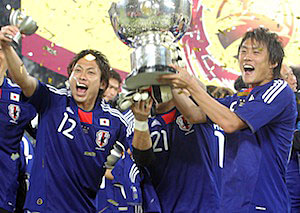
Japan team members celebrate with the AFC Asian Cup trophy after winning the final match against Australia 1-0 in Doha, Qatar, Saturday, Jan. 29, 2011. (AP Photo/Osama Faisal).
In a final of the finest margins, after 120 odd minutes of gripping, contrasting football, it was Japan who ultimately came out on top, winning their fourth continental title from the past six thanks to a superb extra time strike from Tadanari Lee.
For almost an hour it looked like only one team would win, Holger Osieck’s Socceroos. They had managed to impose their physical and high-ball strategy on the game and it looked only a matter of time before the blue wall would crack, notwithstanding an exceptional display from custodian Eiji Kawashima.
But then came the tactical switch from Japanese manager Alberto Zaccheroni that not only neutralised Australia’s most likely outlet to goal, but gave his side an even chance of snatching victory, a chance they eventually took.
The start was up helter-skelter from the Roos, with Carl Valeri, Matt McKay and Brett Holman streaming forward to support the front two. Indeed, McKay may have done better in the opening minutes when teed up by Valeri.
The fact Valeri was so advanced in the opening stages told of the more offensive mood under the new manager, who again shaped up in the 4-4-2 that has been his modus operandi throughout this sojourn in Qatar.
Soon the Samurai Blue were on the ball, settling the game to their pace, with Yasuhito Endo and Keisuke Honda dictating the tempo. But it was slow, with the Roos able to transition comfortably into defence.
In truth, there wasn’t much on offer for Japan, who appeared to be struggling to cover the absence of Shinji Kagawa. Zaccheroni had brought in Jungo Fujimoto, placed him on the right, and shifted Shinji Okazaki over to the left, in Kagawa’s spot, but there was little fluency in the front third early on.
Soon the Roos were back down the other end, where Osieck’s game plan became apparent, not that it should have come as a surprise to anyone within a planet of this tournament.
Utilising the aerial and physical attributes of both Tim Cahill and Harry Kewell, the plan was to get the fullbacks, Luke Wilkshire and David Carney forward, and get balls into the front pair.
From here there were a myriad of half opportunities, either in general play or at set pieces. On one occasion Kawashima managed to get a finger or two to a Kewell flick on that appeared destined for the net.
The start of the second period saw the onslaught continue, with the Roos firmly in control, peppering Japan’s central defenders with cross after cross. Cahill and Kewell were competing for everything, forcing Japan onto Kawashima. It appeared only a matter of time before the Roos got an opener.
Zaccheroni had to react, and react he did.
Recognising that he needed another aerial tower in defence to control Cahill and Kewell, that Okazaki was struggling to control Wilkshire on the left and that the Fujimoto gamble hadn’t worked, he made one personnel change and about a thousand positional changes.
Daiki Iwamasa came on at right stopper, Maya Yoshida moved across to left stopper, Yasuyuki Konno from left stopper to left back, Yuto Nagatomo from left back to left midfield and Okazaki over to his preferred right channel, which had previously been Fujimoto’s domain.
It was clever stuff, designed not only to provide more aerial power at the back, but to stop Wilkshire raiding down the right and release Okazaki on the other side.
From that point, the match was back in the balance. Zaccheroni, if not back in control, was certainly competing.
Soon enough Nagatomo was back to doing what he had done so splendidly throughout the tournament, providing a whipped cross in for Okazaki to head just wide.
While Kewell had a great chance a short time later, for once it was the opposition’s shot-stopper coming up with the heroics.
Given how many times the Roos have had to rely on Mark Schwarzer since their entry into Asia five years ago, it was perhaps ironic, on the night he broke Alex Tobin’s record for the number of caps, that it was the man at the other end who starred.
For once, Schwarzer was powerless to stop the terrific Lee strike.
It was a great tournament from the Socceroos and their manager, but ultimately they fell just 11 minutes short of taking the final into Mark Schwarzer Time, otherwise known as a penalty shootout.
In the end it was a man in only his second game that proved the goal-scoring hero for Japan, just as Schwarzer had been the hero in his second international all of 17 and half years ago.
Ultimately, in the cold hard light of day, the Roos fell a little short, simply unable to offer anything different when their preferred strategy was nullified by Zaccheroni.
Osieck and his men tried, best exemplified by some ironman displays from the likes of Mile Jedinak, Lucas Neill, Valeri and Wilkshire, but couldn’t quite scrap home an equaliser.
Now the Roos have to wait another four years, for a home tournament, to try and emulate the feats of the Matildas last year by winning the continental title at the third time of asking.
Follow Tony on twitter @TonyTannousTRBA





























































































